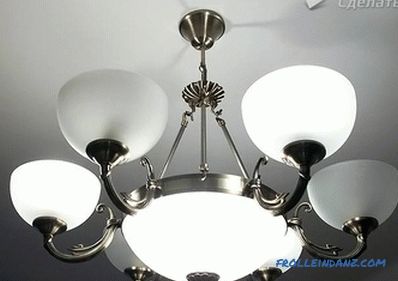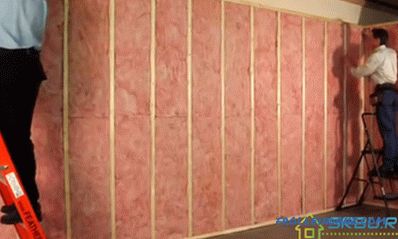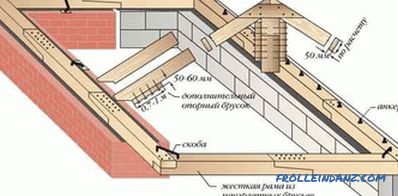The installation of a new chandelier in the room is a significant event. Before you hang the chandelier on the ceiling in the apartment, it must be properly assembled. Fortunately, the design of most chandeliers is not so complicated, so let's proceed to the next part of the preparatory work.
Connection of wires
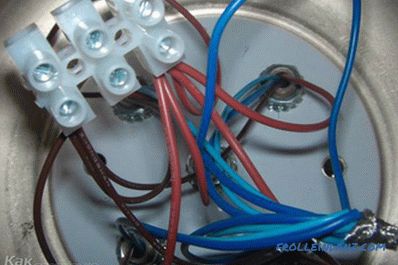 Connection of wires
Connection of wires
Let's begin with the most elementary. First, answer the following questions:
- How many wires come out of the ceiling?
- How many keys does a switch have?
If there are only 2 wires, then forget about the possibility of switching on different parts of the chandelier with a two-button switch. Without the installation of the third wire will not work. This means that all the wires in the chandelier are collected in bundles of a certain color. If 3 wires are supplied to the luminaire, and you need to turn on the light not at the same time, then in the chandelier, the wires going to the cartridge thread and the ground wire are collected in one bundle, while the others are divided into 2 groups, and also twisted in bundles.
Bad contact will not only lead to heating of the wire, but may also cause the housekeeper to fail prematurely.
A simple tool is required for work:
- Pliers.
- Small screwdriver.
- Screwdriver-indicator on batteries.
- Terminal strip.
- Horn key 12.
The need for a key arises when assembling a chandelier. A screwdriver indicator will be required to determine where the wires are connected Take it in your hands, and the moment you touch the screwdriver's sting and its upper part, it should light up - this means that the device is working. Now, holding the top edge of the screwdriver, touch the sting of the thread (or side contact) in the chuck. With your free hand, touch the wires coming out of this cartridge. When you touch one of them, the indicator should light up. Wires of the same color will be "ground".
Insert the separated bundles of wires into the terminal block of your choice and securely fasten it.
Hanging a chandelier
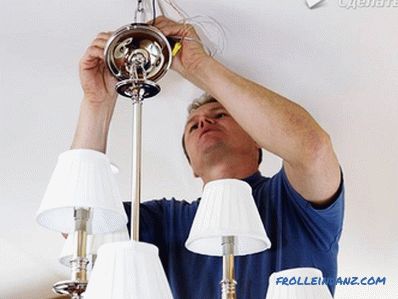 Preparing wires
Preparing wires
Consider two basic ways.
- On the hook.
- On the mounting plate.
Hook
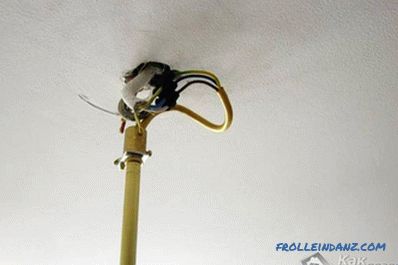 Attachment to the hook
Attachment to the hook
Previously it was the most common method, but now a thing of the past. Nevertheless, many versions of chandeliers are still produced with just such a mount.
Some craftsmen solved this problem in their own way - they replaced the plastic hook with a self-made one made from an electrode for welding.
Mounting plate
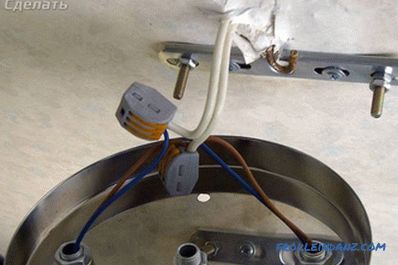
Included with the chandelier is a special mounting plate that you need to properly prepare before you install it on the ceiling. Fasten the screws on it with the screws so that their caps are in the inner part of the bar, just do not clamp them. Insert the bar from the inside of the bowl into the chandelier as it will be installed later, by tightening the decorative nuts until it stops - the bar must be flush with the edges of the bowl of the chandelier, or just below it.
After checking, firmly clamp the screws in the bar so that they do not turn, otherwise removing the chandelier can be a big problem. Attach the bar to the ceiling where it will be installed, and mark the ceiling through the holes. Removing the bar to the side, drill the concrete base of the ceiling and insert the dowel. After this, the ceiling is attached to the ceiling, and the chandelier itself is attached to it. If the base of the ceiling is wooden, the plank is attached to it with screws on the wood.
Electrical connection
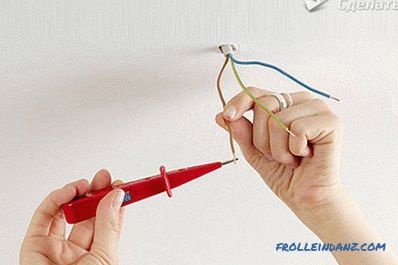 Phase search
Phase search
When the breaker contacts are open on the wires there should be no tension.
This means that when you touch the wires with a screwdriver-indicator, it should not glow. In this case, a screwdriver that works without batteries gives a more accurate result. After turning on the power, the indicator should show the presence of voltage on the two wires. The remaining one is the "ground", which should be connected to the general beam of the chandelier. If in your case it is not so, then this means that the switch does not turn off the phase, but the ground. If you have incandescent bulbs connected, or LED lights, then you can leave it, for housekeepers such a connection is not suitable, since they can blink (this was written above).
In no case do not install the housekeeper if the chandelier is connected through the dimmer control!
Connecting the chandelier with the power unit
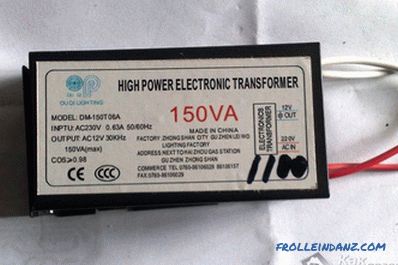 Power supply
Power supply
Often, people try to increase the brightness of the glow by replacing regular lamps with more powerful ones, as a result of which the chandelier ceases to function.
In order for the transformer not to fail, watch the total consumption of lamps - it must be lower than the output power of this device.
If your chandelier with halogen bulbs, then most often they are designed to power 12 V.In this case, the power is connected via a step-down transformer, on which the voltage at the outputs is always written. Where the voltage 220V is indicated, we connect to the network, and the contacts with the designation 12V - to the light bulbs.
When directly connected, the bulbs should be 220V. Otherwise, halogen lamps designed for operation through a transformer will explode, and glass fragments will scatter throughout the room.
All wires must be carefully insulated.
Fastening to a concrete ceiling
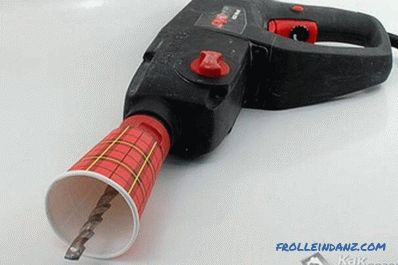 Puncher with dust protection
Puncher with dust protection
For in order to fasten the fixing bar on the concrete ceiling, you need to attach it to the intended place of attachment, and make marks on the ceiling where the holes will be drilled. If the floor is made of hollow slabs, then you need to check the thickness of the concrete in the place where the hole will be drilled, as it may happen that the dowel will have nothing to hold. You may have to step back or otherwise position the bar. In that case, if the change does not work, then you can use anchors, or, to drive a wooden lath into the slab cavity, and fasten the bar to it with screws. To do this, you will need:
- Puncher (or hammer drill).
- Pobeditovoe drill, dowel diameter.
- Screwdriver (screwdriver / drill).
- Dowels (anchors, or screws).
Before you start drilling, make sure that dust and sand do not get into the punch chuck. For this purpose, you can pull a disposable cup on a drill, or a half of a rubber ball, and then drill.
Depending on the mounting method you choose, fasten the bar firmly, but do not overdo it, since it can be bent if you press it very tightly.
On a plasterboard ceiling
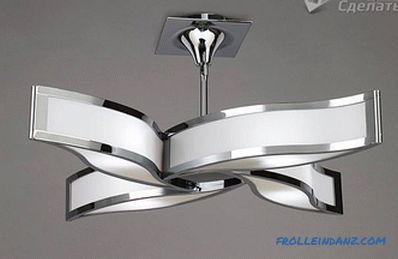 Chandelier fixing on the plasterboard ceiling
Chandelier fixing on the plasterboard ceiling
Which can Difficulties arise when installing a chandelier on a gypsum ceiling? The fact is that both the appearance of the gypsum ceiling and the mechanical strength of the installed structures are important.
It is necessary to decide in advance on the choice of the chandelier, and to determine how it will be fixed. Consider the basic recommendations:
- The place on the ceiling where the heavy chandelier will be located should be further strengthened with a metal profile. This must be taken care of even in the manufacture of the framework of the ceiling structure.
- To fix a small chandelier directly to the drywall, you need to buy fasteners (folding dowels, butterflies). Strengthening is not necessary.
During operation, it is important to observe safety precautions — ensure safe movement under the ceiling and de-energize the electrical system.
If the room cannot be de-energized, then you need to work with rubber gloves of an electrician and use a good tool (nippers and pliers must be with undamaged handles).
Fasten the chandelier to the plasterboard ceiling
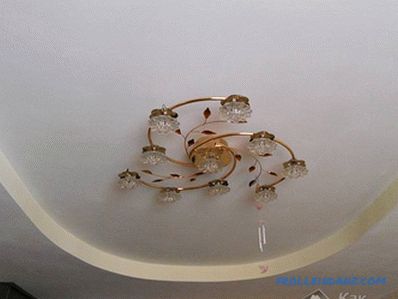 The chandelier on the plasterboard ceiling
The chandelier on the plasterboard ceiling
Drywall has strong mechanical properties, and for this reason the installation is carried out directly to the material itself. But this method has limitations.
- Since a gypsum plasterboard can withstand a load of up to 6 kg per square meter, taking this feature into account, you should give preference to chandeliers with a relatively small weight when buying.
- It is necessary to take into account that deformation of the plasterboard ceiling may occur when using the device, for example, replacing a lamp or if you accidentally hook a chandelier with your hand. Therefore, in order to preserve the attractive appearance of the plasterboard ceiling for a long time, it is not recommended to change the chandelier several times, especially not to make new ones next to the old ones.
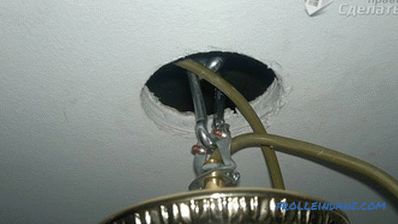 Installation of the hanging chandelier
Installation of the hanging chandelier
First consider the option of mounting the hanging chandelier. First of all, you need to drill a hole in the drywall (under the chosen fastener) and insert a spring dowel or a butterfly - in this place the chandelier will be suspended on the ceiling.
The dowel should be tightened with a nut, and the butterfly should be tightened with a self-tapping screw (it should be clicked). The dowel and butterfly must be equipped with a stud or hook. After that, the hook can hang a chandelier and connect the wiring.
Holes are made at the designated points, as is the case with the hanging chandelier, but there was a hook, and here we will use the dowel butterflies, to which the lath will be drawn with screws. Now the most interesting thing is to hold the chandelier under the ceiling, you need to connect the wiring, and only after that it will be possible to fix the chandelier.
It is extremely inconvenient for one person to do this work, so you need someone who will hold the chandelier until you finish the wiring.If there is no way to wait for help, then make a small hook and hang the chandelier on it for a while so that it does not scratch it.
Fastening to a stretch ceiling
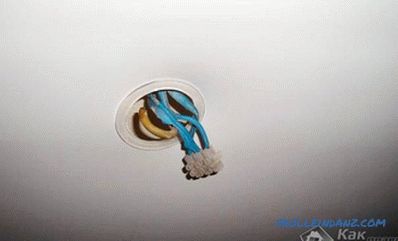 Fastening on a suspended ceiling
Fastening on a suspended ceiling
When arranging a stretch ceiling, you should take care in advance of which chandelier or luminaire will be on the ceiling, and which fixture for the lighting fixture should be used. This is important to take note of, because the tensioned material is not the basis for fixing, and if the integrity of the film is broken, the web will simply burst.
How to choose the right chandelier
 How to choose a chandelier
How to choose a chandelier
It is important to pay attention to the choice chandeliers so that it does not spoil the expensive ceiling coverage. In this case, you need to consider what will be used lamps. For example, it is better to buy a chandelier with energy-saving lamps, as they heat up less in the process. If halogen or incandescent bulbs are used, they should be hidden in the ceiling and not directed at the ceiling, but to the side.
If you purchased a chandelier with cartridges for ordinary incandescent bulbs, it is better to screw in the housekeeper or LED bulbs instead. It is important to know that if overhead chandeliers with a thin metal base, then adjoining the stretch ceiling in a heated state from incandescent bulbs, can lead to its deformation.
You also need to make sure that the base of the light fixture that covers the fastener is free from sharp edges and will not tear the film.
Fastened to a stretch ceiling
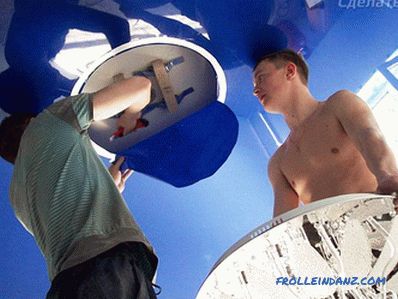 Installing the chandelier on the stretch ceiling
Installing the chandelier on the stretch ceiling
Most common and a reliable installation method is hook mounting. But this method is only suitable for hanging chandeliers.
- if the base under the suspended ceiling is reinforced concrete slabs and the hook has already been installed by the builders, then it is necessary to determine if it is set at a sufficient height;
- if the hook location may not be suitable, then Using a dowel or anchor, you can install the hook yourself by cutting an old fastener with a grinder;
- another way - in the place where there is an installation hole in the stretch ceiling, a wooden mortgage is installed and the hook is attached directly to it.
It is necessary to know at what distance from the main ceiling the stretch ceiling will be, and also bring the ends of the electrical wire to the place of installation.
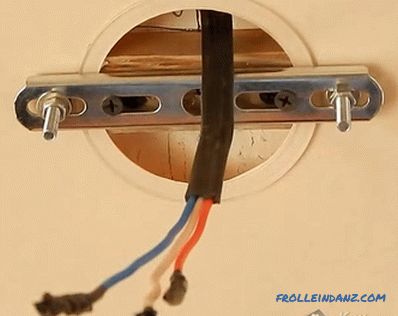
After the canvas of the stretch ceiling is stretched, where the hook is located, you need to glue the thermal ring, inside of which a hole is cut out for the wires, and then fixing the chandelier. This happens in this way: the chandelier should be hung on a hook, the wires should be connected, and the fixing point should be covered with a lighting fixture cap.
The installation of the chandelier can be made on a lath or mounting plate.
Most lighting fixtures come with a special fastener — a metal profile with screws (the mounting bracket mentioned earlier). It is attached to the main ceiling, and the chandelier over the stretch ceiling on the screws with decorative nuts.
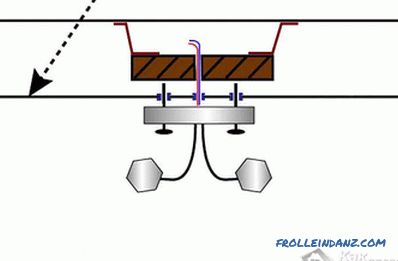 The fixing scheme for the chandelier
The fixing scheme for the chandelier
The fixing of the chandelier to the stretch ceiling also includes mounting to the main ceiling of a wooden bar, the length of which should not reach the stretch ceiling by almost 1-2 cm. Otherwise, the bar will protrude and with time may tear the film of the stretch ceiling. Next, the bar should be attached to the ceiling using self-tapping screws with dowels. And when using a wooden bar it is also necessary to make a hole, reinforcing it with a thermal ring.
The mounting bar is attached to the bar without leaving the hole. Then the base of the illuminant is attached to the plate. Next, the holes of the base must be connected to the studs (or screws) and fasten with nuts.
In some cases, instead of a wooden bar, thick moisture-resistant plywood with metal legs is used as a base.
Video: mounting the chandelier on a stretch ceiling
Fixing the chandelier on a cross-shaped bar
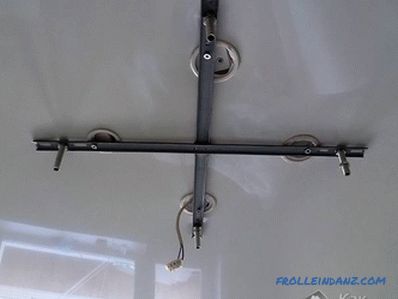 Fixing for chandeliers
Fixing for chandeliers
This type of fixing is intended mainly for heavy chandeliers with a wide base. Due to the fact that the mounting holes are separated from each other, it will be impossible to fix the chandelier within the hole. To this end, a wooden block in the size of a cross is attached to the main ceiling again as a base. In the canvas of the stretch ceiling, you must carefully cut five holes and reinforce them with thermal rings: one large hole to remove the electrical wires and connect the power, and the other four - smaller. Instead of a thermal ring of small diameter, where screws are screwed in, you can use pieces of plastic that are glued to the stretch ceiling.This procedure must be done, otherwise the film where the hole is made will tear.
When the wires are connected, you can hang the chandelier on the cross and fix it with nuts.
Video: installation of the chandelier on the cross-shaped strips
Photos
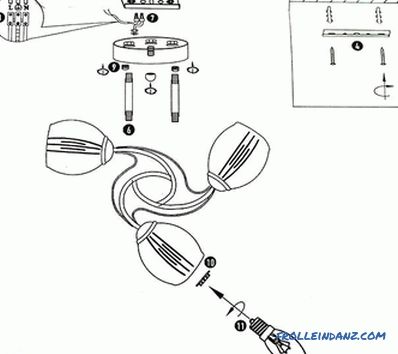 Assembly scheme of the chandeliers
Assembly scheme of the chandeliers
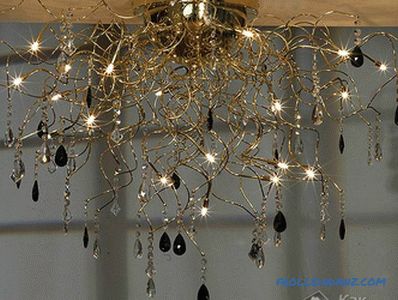
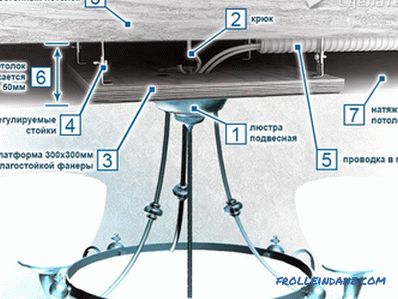 Mounting on a suspended ceiling
Mounting on a suspended ceiling
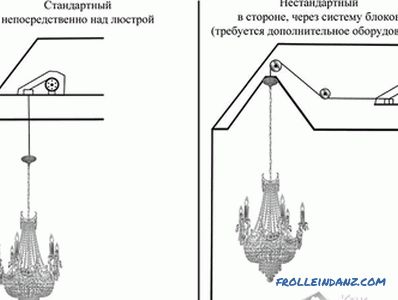 Installation of the elevator
Installation of the elevator
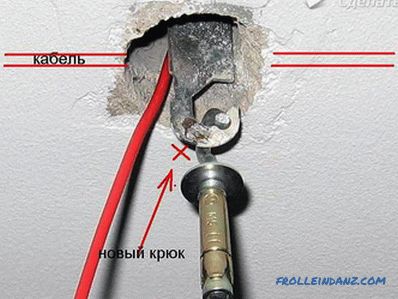 Hook for the chandelier on the concrete ceiling
Hook for the chandelier on the concrete ceiling
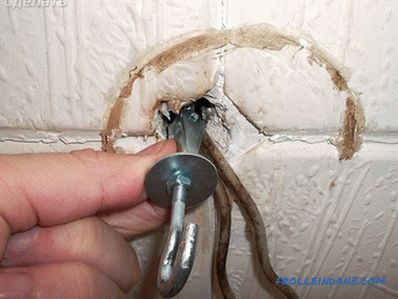 Mounting anchor hook
Mounting anchor hook
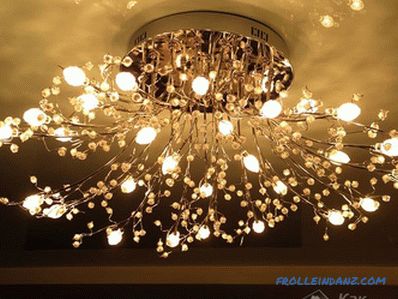
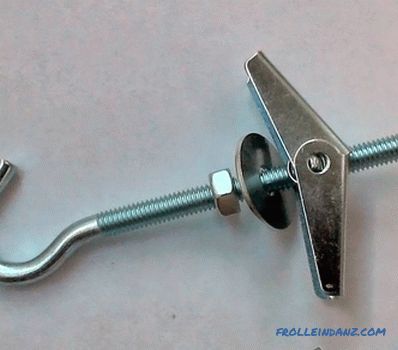 Butterfly hook
Butterfly hook
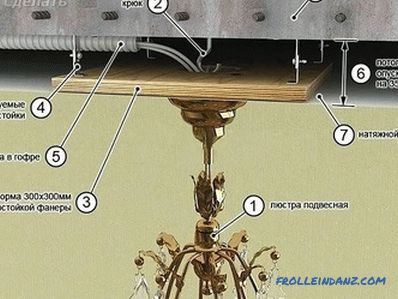 Fixing the chandelier on the hook
Fixing the chandelier on the hook
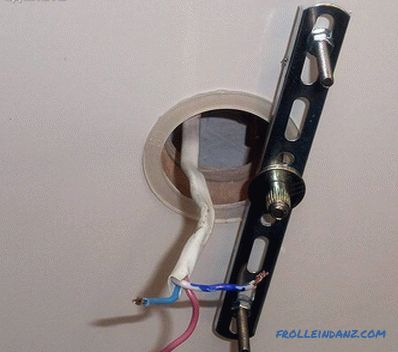 Fixing on plasterboard
Fixing on plasterboard
